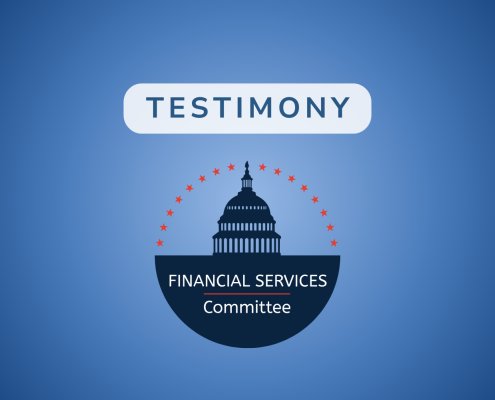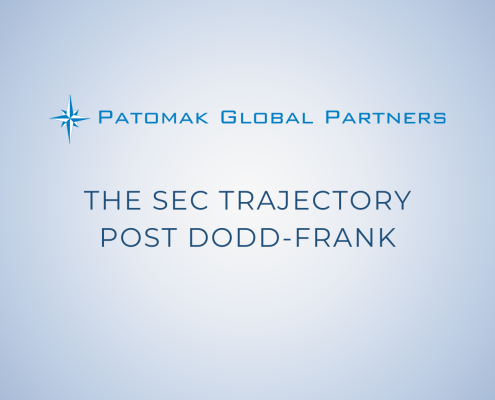Insights

MarketWatch: Volcker, Angelides in Opposition on Regulatory Rollback
News Patomak Global PartnersBy Frances McKenna
The Senate is expected to approve this week the most significant reversal of regulatory requirements for financial services firms since the financial crisis, including a significant retrenchment of the heightened scrutiny for banks with less than $250 billion in assets that was implemented by the Dodd-Frank Act of 2010...
Paul Atkins, chief executive of Patomak Global Partners, LLC...told an audience of international bankers at a conference in Washington on Monday that rather than what was being characterized by critics and in the press as a wholesale upheaval of Dodd-Frank regulation, the proposal was a 'refinement' of an 'absurdly low threshold' for bank regulatory scrutiny.

Compliance Reporter Q&A with Paul Atkins
News Patomak Global PartnersPaul Atkins is the CEO of Patomak Global Partners, a financial services consultancy focusing on strategy, compliance, enforcement and litigation located in Washington D.C. He is also a former commissioner at the Securities and Exchange Commission, appointed by George W. Bush. Atkins spoke with Compliance Reporter about his expectations for potential deregulation during the Trump administration, and hot button issues, such as personal liability, that compliance teams should have top of mind.

CNBC.com: To Reform the Housing Market, Get Rid of These Two Bloated Behemoths
News Paul AtkinsBy Paul Atkins
News of a bipartisan effort underway in the U.S. Senate to reform the housing finance industry is a welcome development, but the devil is in the details.
Almost a decade after the financial crisis, in addition to repairing damage caused by the flawed Dodd-Frank law, policymakers must work swiftly to wind-down Fannie Mae and Freddie Mac, the two institutions at the heart of the last financial crisis.

WSJ: SEC Says Conflict Minerals, Pay Ratio Rules Remain in Force
News Patomak Global PartnersWall Street Journal CFO reporter Tatyana Shumsky writes:
Companies must continue to comply with the Securities and Exchange Commission’s rules on disclosing “conflict minerals” and the ratio comparing executive pay to the median employee, said Shelley Parratt, acting director of the SEC’s division of corporation finance, on Friday.
SEC acting chairman Michael Piwowar in recent weeks has requested public comment on the two provisions of the Dodd-Frank overhaul law. Mr. Piwowar also instructed SEC staff to look at the rule mandate and see if alternate interpretations could offer some relief to companies trying to comply.

CNBC: Paul Atkins Discusses Dodd-Frank Reform, Including the Volcker Rule, and Conflict Minerals
News Patomak Global PartnersPatomak CEO Paul Atkins discusses Dodd-Frank reform, including the Volcker Rule, conflict minerals, and the important role of the Vice Chairman for Supervision at the Federal Reserve.

Keynote Address: Broker/Dealer Regulation and Enforcement 2016
Securities Paul AtkinsOver the last eight years, American businesses, investors, and consumers have been buried under a mountain of costly red tape. Now, I do not need to tell you that the economy is not as good as it could be. One of the major reasons is the growth of legislation and consequent regulation emanating from Washington that has stymied growth.

The SEC Trajectory Post Dodd-Frank
Securities Patomak Global PartnersDan Gallagher addresses the SEC's recent activities after Dodd-Frank and the trajectory of the Commission at Equilar's annual Executive Compensation Summit in Boston.

Global Regulatory Standardization: A Critical View
Securities Patomak Global PartnersRegulatory harmonization sounds like a noble goal. But instead of facilitating cooperation among regulators from different jurisdictions, it has morphed into the imposition of one-size-fits-all regulatory standards.

Reuters Column: Roots of the Next Financial Crisis: The Last One’s Veterans Give Views
News Patomak Global PartnersDan Gallagher quoted in Reuters guest column:
There is a general consensus that the next financial crisis will follow the familiar arc of bubble, falling asset values, a run, credit/liquidity crunch, finger-pointing, new regulation, financial innovation, and unintended consequences for both regulation and innovation.

U.S. House Financial Services Committee Testimony by Paul Atkins
Testimony Patomak Global PartnersPaul Atkins testifies at the hearing on “The Dodd-Frank Act Five Years Later: Are We More Stable?”

